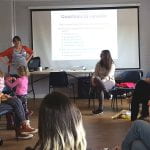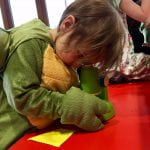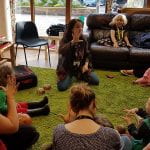Recently, I gave a talk to a group of scientists about emotional development in children. Not much new there, that’s pretty much what I do. Except this time I got to give the talk in my socks, in an activity centre in the middle of the peak district, and the scientists weren’t my usual peer group – these scientists were a group of parents who’d signed themselves up for Parenting Science Gang, a fully immersive citizen science programme, led by Sophia Collins and funded by the Wellcome Trust. The programme is multi-faceted, engaging with several different parent interest groups and offering live chats with scientists, encouraging groups to ask questions and look for existing research, and this – the first residential session for parents to come together.
I know that some of the questions that I am interested in have been shaped by my own parenting experiences so far, and so it makes perfect sense that parents have questions about child development that scientists haven’t addressed yet. Our session focused on how children develop emotion regulation skills, and most importantly for our group, who were largely parents of toddler and pre-schoolers – how can we best support that, and manage tantrums for the best.
We considered research on parent-child communication, sleep and sensory processing, the typical development of children’s understanding of own and others’ emotions, and the possible impact of screen time; and came up with a whole lot more questions that are still unanswered. The groups will continue to work on refining their questions, and will work with scientists to develop a research programme that allows them to address this. For my part, I am hopeful that this group will help me to shape the next stage of our pre-school project on behaviour development.
The benefit of a weekend residential was clear. Parents were able to meet each other, with and without their children (who were most usually entertained by the wonderful storyteller, pile of dressing up clothes and great outdoors), and were able to test out ideas in a space that allowed for constructive questioning and collaborative idea-sharing. Parents came from all different backgrounds, but shared the goal of asking useful questions. It was a privilege for me to spend time with interested and involved people, and to learn so much more about how citizen science might best be realised – a genuinely collaborative effort, with structure, support and group willing to ask questions.
Parents also benefit from being part of these projects in other ways –knowing how and where to find research promotes confidence in parenting decisions, and allows parents to make their own distinctions between ‘advice’ and something more evidence-based. I think the children who came along got to see something a little bit different; their parents taking part in active conversations about science, and them getting to trial out some of their own experiments.
If you want to know more about the project (and, really, you should), then have a look here: http://parentingsciencegang.org.uk/about


